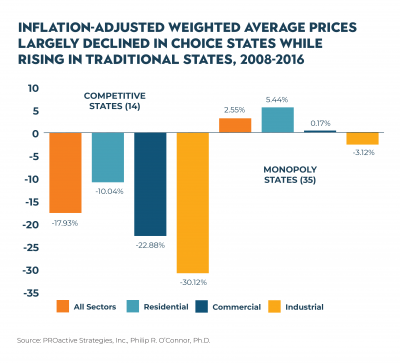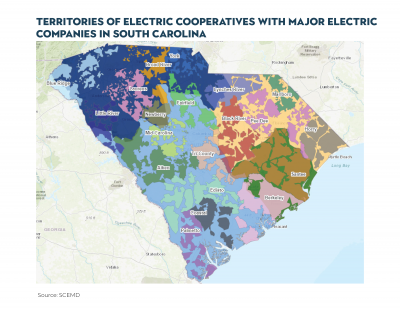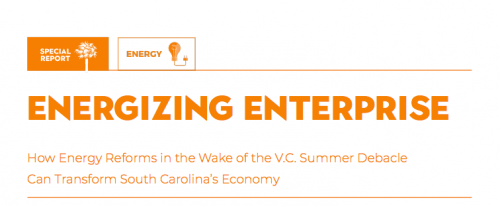Energizing Enterprise: How Energy Reforms in the Wake of the V.C. Summer Debacle Can Transform South Carolina’s Economy
Electricity Choice will lower power bills in South Carolina. Here’s a principled, practical and proven plan to make that happen.
SUMMARY
South Carolinians pay more for electricity than any other state in the union. But a simple innovation can provide relief. Eliminating defined service territories for electrical utilities will inject free enterprise into the electricity market in the Palmetto State. The experiences of other states show how electricity choice will lower prices and improve customer service and innovation. This is a welcome solution for South Carolina, a state with many providers that due to fixed territories and fixed prices, denies its citizens access to multiple options.
Download the full, 54-page report here.
THE BAD NEWS ABOUT THE SOUTH CAROLINA ELECTRICITY MARKET
The headline-grabbing bad news for the South Carolina electricity customer, also known as the “ratepayer,” is the failure of the V.C. Summer nuclear plant expansion and the fact that we have a dinosaur of a state-owned utility, Santee Cooper. But few energy customers are aware of the rest of the story: power costs and prices are high and rising here.
- South Carolina leads the nation in consumer spending for electricity.
- South Carolina’s prices for industrial, commercial, and residential use are higher than our neighbors and competitors in North Carolina and Georgia.
- Every electric utility operating in South Carolina has had pricing or management issues (or both). The $10 billion V.C. Summer shutdown (SCE&G, Santee Cooper) is catastrophic.
- All utilities are regularly raising electricity rates.
- Santee Cooper, the government-owned utility in South Carolina, is not operating as an efficient, modern utility but like an inefficient state agency. Its customers owe $14 billion in principal and interest for V.C. Summer and will be paying for the next 38 years.
COMPETITIVE STATES VERSUS MONOPOLY STATES
There is another way. The adjacent figure shows the price changes over the last eight years in the fourteen states that have competitive markets for electricity versus those that have monopoly markets (including South Carolina). In a monopoly market, consumers of power have only one option for purchasing electricity and the price is set by the government. Not surprisingly, choice has meant a drop in price. (Prices fell in monopoly states for only the very largest customers, Industrial buyers.)

THE GOOD NEWS ABOUT THE SOUTH CAROLINA ENERGY MARKET
The good news for the Palmetto State electricity customer is that South Carolina is home to numerous electricity providers—large investor owned utilities, electric cooperatives, municipals, and a state-owned utility. The adjacent map shows the extensive overlap in territories. (Note: The competition is actually more robust than is shown. This map does not include municipal electric utilities.)
Currently, however, in South Carolina, providers must charge the rates set by the government (the South Carolina Public Service Commission or PSC) and may not serve customers outside their PSC-assigned territory.

WHAT WOULD HAPPEN IF WE HAD ELECTRICITY CHOICE?
If the state of South Carolina were to stop price fixing and remove the barriers set up by the PSC, overlapping utilities could serve any customer they wish who is willing to be their customer. Everyone in the Palmetto State with an electric meter would enjoy a “willing provider, willing customer” relationship with their electric utility.
- Businesses would flock to South Carolina knowing there would be competition for their business from rival utilities (as is the case in Georgia). The other piece of good news is our neighbor to the west, the State of Georgia, has a statute that requires those who consume large quantities or “load” of power to be able to choose their electricity provider. Competition there is fierce and has led to lower prices and better service for businesses even the size of a Target retail store or Kroger grocery store.
- Residential customers, what we might call “the little guys,” would finally be able to stop subsidizing other customer classes (commercial and industrial) and recoup some of their losses due to recent rate increases.
FREE ENTERPRISE IS USUALLY THE ANSWER IF WE WANT PROSPERITY
Free Enterprise built this nation. Our most quoted founding father of late, Alexander Hamilton, once wrote: “Monopoly…is a great enemy to good management…” We might translate that statement to “without any competition for your business, you will pay too much.” In the case of electricity, think of it this way: would you like to shop for power like you would for a mortgage (“when lenders compete, you win”) or does the DMV experience appeal to you?
WHAT IS THE PRACTICAL SOLUTION?
Thankfully, the legislative fix is simple: repeal the Territorial Assignment Act. A short and simple bill can remove Section 58-27-640, “Assignment of service areas” from the state code.







